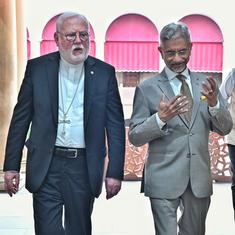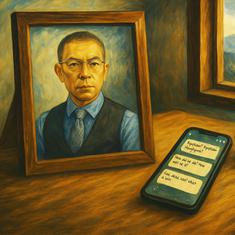Apple warns several Opposition leaders ‘state-sponsored attackers’ may have targeted their phones
Union minister Ashwini Vaishnaw said that the allegations of snooping were being made by the government’s ‘compulsive critics’.

Technology company Apple has warned several Indian Opposition leaders and at least four journalists that it believed that their iPhones may have been targeted by “state-sponsored attackers”.
Among those who announced on X, formerly known as Twitter, that they had received messages from the firm saying that attackers were trying to compromise their devices were the Congress’ Shashi Tharoor, TS Singhdeo, Revanth Reddy, Pawan Khera and Supriya Shrinate.
Opposition leaders from other parties who made similar statements on social media were Communist Party of India (Marxist) leader Sitaram Yechury, Trinamool Congress MP Mahua Moitra, All India Majlis-e-Ittehadul Muslimeen chief Asaduddin Owaisi, Shiv Sena (Uddhav Balasaheb Thackeray) MP Priyanka Chaturvedi, Samajwadi Party chief Akhilesh Yadav and Aam Aadmi Party MP Raghav Chadha.
The political leaders, excluding Owaisi, belong to the INDIA Opposition bloc. All of them are critical of the Modi government.
Union minister Rajeev Chandrasekhar said that Bharatiya Janata Party leader and Rajya Sabha MP Piyush Goyal too received the alert, reported NDTV.
Observer Research Foundation president Samir Saran and the Deccan Chronicle resident editor Sriram Karri also said that they had received warnings from Apple.
The Wire reported that its founding editor Siddharth Varadarajan also received such an alert. Journalists Ravi Nair and Revathi said that they too had been targeted.
“Phone was getting drained of battery majorly the last few days and was acting weird,” Revathi wrote in a social media post. “Not the first time! But again makes you feel unsafe and even angry.”
The Centre, however, has alleged that political parties were doing “destructive politics”.
Was notified by Apple late last night that my iPhone linked to my Apple ID is being targeted … I have implemented the on-device remedial measures suggested by Apple and am reaching out to experts as well …. pic.twitter.com/x9KbvcV1ez
— Samir Saran (@samirsaran) October 31, 2023
Received text & email from Apple warning me Govt trying to hack into my phone & email. @HMOIndia - get a life. Adani & PMO bullies - your fear makes me pity you. @priyankac19 - you, I , & 3 other INDIAns have got it so far . pic.twitter.com/2dPgv14xC0
— Mahua Moitra (@MahuaMoitra) October 31, 2023
What did the messages say?
The messages warned the recipients that “if your device is compromised by a state-sponsored attacker, they may be able to remotely access your sensitive data, communications, or even the camera and microphone”.
The notification added, “While it’s possible this is a false alarm, please take this warning seriously.”
On its website, Apple says: “Unlike traditional cybercriminals, state-sponsored attackers apply exceptional resources to target a very small number of specific individuals and their devices, which makes these attacks much harder to detect and prevent. State-sponsored attacks are highly complex, cost millions of dollars to develop and often have a short shelf life.”
However, in a subsequent clarification, the company said that it does not attribute the threat notifications to any specific state-sponsored attacker, The Hindu reported. An Apple spokesperson said the company is not specifically saying that the Indian government was responsible for these attacks, but added that it does not rule out the possibility.
“State-sponsored attackers are very well-funded and sophisticated, and their attacks evolve over time,” Apple said. “Detecting such attacks relies on threat intelligence signals that are often imperfect and incomplete. It’s possible that some Apple threat notifications may be false alarms, or that some attacks are not detected.”
The American technology company said that it is unable to provide information about what causes them to issue threat notifications since that may help state-sponsored attackers adapt their behaviour to evade detection in the future.
Citizens’ freedoms being compromised, alleges Opposition
Nonetheless, Opposition leaders accused the BJP-led government at the Centre of using illegitimate means to target them, and contended that citizens’ freedoms were being compromised.
Aam Aadmi Party legislator Raghav Chadha said that the alerts from Apple come just months before the general elections.
“It must also be placed within the broader attacks on the opposition who are facing relentless repression by investigatory agencies, politically motivated criminal cases and incarceration,” Chadha said.
Early this morning I received a concerning notification from Apple, warning me about a potential state-sponsored spyware attack on my phone. The notification states that, “If your device is compromised by a state-sponsored attacker, they may be able to remotely access your… pic.twitter.com/JrVD9Zh9im
— Raghav Chadha (@raghav_chadha) October 31, 2023
Chhattisgarh Deputy Chief Minister and Congress leader TS Singhdeo asked whether spying on public representatives was “the most optimal way to spend the taxpayers’ money”.
ये सियासत है कि लानत है सियासत पे 'सदा'
— T S Singhdeo (@TS_SinghDeo) October 31, 2023
ख़ुद हैं मुजरिम बने क़ानून बनाने वाले।
Is this the most optimal way to spend the taxpayers' money? Snooping and spying on public representatives?
Unable to defeat the alliance of opposition parties in the political battlefield, the BJP… pic.twitter.com/ZoxMqCDCpa
Congress MP Rahul Gandhi said on Monday that the Centre is distracting people from its favouritism towards the Adani Group.
“Very few people are fighting against this but we are not going to get scared,” he said. “We are going to fight this, do as much tapping as you want, I am not bothered. If you want my phone, go ahead and take it.”
देश में विपक्ष के नेताओं को एप्पल का नोटिस आया है। जिसमें लिखा है कि- सरकार द्वारा आपके फोन को हैक करने की कोशिश की जा रही है।
— Congress (@INCIndia) October 31, 2023
ये मैसेज मेरे ऑफिस के लोगों के साथ ही विपक्ष के कई नेताओं को आया है। हमारे पास इसकी पूरी लिस्ट है।
: @RahulGandhi जी pic.twitter.com/wNCjUDj6k8
In a press conference on Monday, Akhilesh Yadav said that the alerts to Opposition leaders reflect the sad state of Indian democracy. “The freedom and privacy of citizens are being compromised,” Yadav said. “And it is happening to such an extent that top leaders of political parties are being spied on. There is no place for this in a democracy.”
#WATCH | On multiple opposition leaders alleging 'hacking' of their Apple devices, Samajwadi Party chief Akhilesh Yadav says, "This is a sad thing...I got this message in the morning which says that your device is being hacked or surveillance is being done by the 'state-sponsored… pic.twitter.com/PTA9yFG5AR
— ANI (@ANI) October 31, 2023
Priyanka Chaturvedi said she has been an Apple user for 20 years, but has never received such a message before, according to PTI.
“You can understand how flustered the central government [is] that it is doing a surveillance on Opposition leaders,” she said.
VIDEO | "I've been an Apple user for the last 20 years, but never have I ever received a message warning about a state-sponsored attack. You can understand how flustered the central government that it is doing a surveillance on opposition leaders," says Shiv Sena (UBT) leader… pic.twitter.com/MD01tjd203
— Press Trust of India (@PTI_News) October 31, 2023
‘Compulsive critics’ making allegations, says Union minister
At a press briefing, Union Information Technology Minister Ashwini Vaishnaw said that the allegations of snooping were being made by the government’s “compulsive critics”. “Whenever these compulsive critics do not have any major issue, the only thing they say is surveillance,” he said.
Vaishnaw also claimed, quoting Apple, that the alerts had been sent across 150 countries, ANI reported.
However, it is unclear if Apple meant to say that individuals in 150 countries were notified in this instance, or overall since late 2021, when the company introduced the feature.
Further, Vaishnaw said Apple’s notification shows that it has no clear information on the issue.
In a series of tweets, the minister said that the information provided by Apple seems “vague and non-specific”.
“Apple states these notifications may be based on information which is ‘incomplete or imperfect’,” he said. “It also states that some Apple threat notifications may be false alarms or some attacks are not detected.”
However, Vaishnaw said that the government takes such allegations very seriously and will investigate the matter.
“In light of such information and widespread speculation, we have also asked Apple to join the investigation with real, accurate information on the alleged state sponsored attacks,” the minister added.
In light of such information and widespread speculation, we have also asked Apple to join the investigation with real, accurate information on the alleged state sponsored attacks. (5/5)
— Ashwini Vaishnaw (@AshwiniVaishnaw) October 31, 2023
Pegasus case
In July 2021, an investigation by a group of 17 media organisations and Amnesty International had shown that Pegasus spyware was being used for unauthorised surveillance of journalists, activists, and politicians across the world, including in India.
The spyware is licensed to governments around the world by the Israeli cyber intelligence company NSO Group.
In India, Congress leader Rahul Gandhi, former Election Commissioner Ashok Lavasa, Union ministers Ashwini Vaishnaw and Prahlad Singh Patel, industrialist Anil Ambani and former Central Bureau of Investigation Director Alok Verma were among the potential targets, The Wire had reported.
The Indian government had denied these allegations. Vaishnaw, the Union information technology minister, told Parliament in July 2021 that illegal surveillance was not possible in India.
NSO Group insisted that it sells the software only to “vetted governments” with good human-rights records and that Pegasus is intended to target criminals.
Following the reports, the Supreme Court appointed an expert committee to look into the allegations. In August 2022, the court said that some malware was found on five of the 29 phones that the panel examined. However, it was not clear whether the malware was Pegasus.
The judges also took note of a finding by the panel that the Centre did not cooperate with the inquiry.
In March, the Financial Times reported quoting unidentified persons that the Indian government was looking for spyware that has a “lower profile” than Pegasus. It reported that the Centre was willing to spend up to $120 million to obtain the spyware. The defence ministry had declined to comment on the report, the newspaper said.









